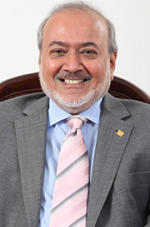Wockhardt saw a new plant that will make sterile injectable drugs as its best shot at restoring a U.S. business devastated by FDA product bans. But the Indian company said today that facility--a plant it has called "one of a kind in Asia"--will not be shipping to the U.S. any time soon after the FDA found shortcomings during a recent inspection to judge whether it is fit for U.S. exports.
 |
| Wockhardt Chairman Habil Khorakiwala |
Wockhardt today reported to the Bombay Stock Exchange that an inspection of its new facility in Shendra, Aurangabad, resulted in 9 observations. It said it is making the appropriate responses to the agency. The drugmaker also pointed out that because the facility is new, there is no supply currently being sold into the U.S., so ostensibly no effect on sales.
But the damage has already been done in that regard. As Reuters reports, about half of its generic drug sales had come from the U.S. before the FDA found serious issues and in 2013 banned two Wockhardt plants that were key to its U.S. business. Now only about 20% of its sales are generated from the world's biggest pharma market. Today's news was a further kick in the gut to the drugmaker's financial health, with its stock price plummeting 17%, to its lowest point in four months, Reuters reports.
Wockhardt has indicated that it is marking progress at getting the two banned plants back online and expects that to happen this year. Last year, to ensure that all of the suspect products shipped from those plants had been cleared out, the FDA had the drugmaker recall anything that might still be lingering. The Indian company recalled 7.2 million bottles, cartons, pouches and drums amounting to hundreds of millions of tablets and capsules.
Wockhardt is one of several of India's largest generic drugmakers to have seen its business outlook dimmed after running afoul of FDA problems. The agency has banned a key plant owned by Sun Pharmaceutical, India's largest drugmaker, as well as four plants owned by Ranbaxy Laboratories, which Sun bought last year. Sun in November reported that since the ban on its Halol plant, U.S. sales, at $510 million, slipped 28% in the last quarter. The same month, the FDA hit Dr. Reddy's ($RDY) with a warning letter for three of its Indian plants. The agency last year also issued a warning on three Mylan ($MYL) plants in India that are at the heart of its sterile injectable drug business.
- access the BSE filing here
- read the Reuters story